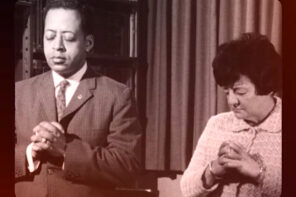The end of election season has various commentators reflecting on what the vote for Barack Obama (and against the Republican Party) means for women. At Jezebel, Erin Gloria Ryan signaled a kind of defeat in the “war on women” by assessing the losses suffered by “team rape”; in USA Today, Amanda Marcotte charged that Republicans lost the culture war by, among other things, ignoring women’s reproductive rights; and Hanna Rosin, writing for CNN, was less convinced that this vote meant anything historic for women, though she did acknowledge that female officials have gained a broader access to power.
I’m still fixated, however, on a couple of phenomena that have, quite likely, already fallen off of most people’s radar: the weird conjunctions between religion and feminist politics that have emerged over the past year. Notable in this regard (of course) are those Nuns on the Bus. But the more perplexing example, I think, is the Pussy Riot phenomenon which, as I see it, marks a new kind of relation between religiosity and feminist politics.
Imprisoned band members of the Russian punk collective Pussy Riot may be on their way to work camps in the furthest reaches of Russia, while their very “brand” is now the subject of heated dispute. But it’s still too soon to tell what remains to be done in the name of—or in communal solidarity with—Pussy Riot. Last month, four women occupied St. Paul’s Cathedral in London by chaining themselves to the altar—allegedly a display of concord with Pussy Riot’s “punk prayer.” Additionally, the New York Times reports that several women (arrested for wearing the iconic Pussy Riot balaclavas at a protest in front of the Russian consulate) will be challenging an 1845 New York mask law that prevents crowds of masked bodies from gathering in a public space.
There’s something extremely foolish about the bright neons of these balaclavas, about Pussy Riot band members’ animalesque nicknames (Squirrel, Sparrow), about their “prayer” that the Holy Virgin might kick old Putin to the proverbial curb of their domestic political scene. But foolishness isn’t anathema to Pussy Riot’s feminist politics. In fact, band member Nadezhda Tolokonnikova argues that their protest was a kind of yurodstvo—some variant of “holy foolishness.” To the extent that Pussy Riot continues to infect, inflect, or influence feminist politics, I think it’s worth pointing out how novel and unprecedented this strange hybrid blend of feminism and religion really is.
Bringing the Riot Grrrl Aesthetic to Church
When I first heard about the band’s “punk prayer,” I was inclined to assume that there wasn’t anything especially religious about it. Sure, it happened in a church, but Pussy Riot members had, after all, been charged with “hooliganism motivated by religious hatred.” Then, after reading a translation of their closing statements in n+1 I realized that what they were challenging was a perceived misappropriation of religion, rather than religiosity itself. And I’m not alone in that sentiment. Apparently even Sister Florence Deacon is inclined to agree that they didn’t mean any harm to the church.
The band members have, in fact, publicly condemned the destruction of Orthodox crosses. In her closing statement at the trial, Yekaterina Samutsevich took what sounds like a protective stance toward the faith and expressed disgust over the fact that Putin “felt the need to exploit the Orthodox religion,” especially with so many other secular tools of power at his ready disposal. Maria Alyokhina took a slightly different tack in her closing statement, quoting liberally from the Gospels of Matthew and John to criticize the Orthodox Church, and to express the basic motives of their punk prayer. She also advanced some normative claims about religion (what it should and shouldn’t be): “I think that religious truth should not be static,” she charged, “that it is essential to understand the instances and paths of spiritual development, the trials of a human being, his duplicity, his splintering.” It’s a constantly shifting process, a path that we discover.
Tolokonnikova argued that, “there is no single, unified group of Orthodox believers, as the prosecutor would like to prove. This unified group does not exist.” In other words: religion is irreducibly complex. And she even compared the allegedly heretical nature of the Pussy Riot trial to that of Socrates. “Socrates was accused of corrupting the youth with philosophical discussions and refusing to accept the Athenian gods… [but] he had a living connection with the divine voice, and he was not, as he insisted many times, by any account an enemy of the gods.” Did Pussy Riot, similarly, have a direct connection with the divine? Was their ironic prayer to The Virgin for real?
All of this is merely to emphasize that the band members have worked to make their protest movement religiously relevant. It’s certainly possible to read their closing statements as a publicity stunt that’s meant to rectify their actions in the eyes of believers. Still, the fact that the band members are defiantly arguing that the gods are on their side is significant. Ultimately, not only are the innermost feelings of the members of Pussy Riot impossible to measure, they’re functionally irrelevant. What’s far more interesting, far more relevant, and far easier to reflect on, are the ways in which they publicly entangle feminism, religion, and politics.
If “utopia” shows us what doesn’t exist (but should), Pussy Riot uses religion as one of their tools to confront us with a kind of utopian challenge. They bring a riot grrrl aesthetic to church, staging a kind of irreverent spirituality that asks God’s more feminine side for political help: to save them from the men who are in charge. Without losing sight of the fact that their hopes are foolish, they gesture toward a more utopian ideal (that “no place”) where world politics aren’t tainted with a misogynistic dominance and control. In a year where the so-called “War on Women” has made consistent headlines, Pussy Riot’s politics have swept in like a breath of fresh air, bringing a little holy foolishness with it.
I’ve always been careful when I explain to fellow feminists—especially feminists in academia—that my field is religion and theology. I’m cautious to emphasize, especially, the critical nature of my religious curiosities. First of all, because it’s the truth, but also because I’ve always assumed that feminists (by and large) tend to be less religious—something a recent survey of British feminists seems to corroborate. Feminism and religion don’t often make for the most comfortable of bedfellows as religious authority has, for so long, been patriarchal. There’s never been a female pope. If you’re a Buddhist nun, you’re obligated to adhere to eight additional rules that reinforce the communal authority of men. The list of feminist grievances against religious tradition goes on. For the time being, I won’t.
And yet this broad line of reasoning—that feminists are less religious—is simply misleading. Nothing, perhaps, has challenged the alleged secularism of feminism in recent years like Islamic women’s issues. The Islamic practice of covering with some form of veil has, of course, been the subject of much debate—especially since France instituted its ban on full-face coverings. Against the charge that veiling is some form of religious oppression, many have argued that in many cases it might be better understood as an Islamic feminist practice—a claim that’s now so mainstream (albeit, not uncontroversial), you can even read about it in Time magazine. From this angle, the French ban on full-face veils looks, itself, like an act of patriarchal oppression.
What I think this shows us is that religious practice—contextualized—can become an ally for women who want to resist the state’s political control over their body. It questions any easy assumptions that a feminist politics must adhere to specific rules about the body—rules that are dictated by either religious authority, state authority, or by fellow feminists. It’s simpler, in some ways, to assume that religion and feminism are at odds. It’s easier to assume, perhaps, that religion is simply the provenance of those who use tools like pro-life politics to fight feminist agendas. It’s much more complicated to think of religion as something Janus-faced; something that’s both a resource and an adversary in the political struggles that feminists face.
The Utopian Virus
Religion has always haunted feminist politics in one form or another—more often than not, like a skeleton in the closet. One of Elizabeth Cady Stanton’s less-remembered political projects was her Woman’s Bible (first published in 1895)—which was received with great hostility by some of her fellow suffragists who wanted the movement to be entirely non-sectarian (political without being religious). The book was, mostly, a critical project: decrying biblical laws and images that oppressed women. Nonetheless, it seemed to many like an anchor in the wrong harbor. The old, iconic photograph of Mary Daly with her battle-axe is still a celebrated image of the irreverent theologian who dared to “castrate” God. But Daly’s more spiritually affirmative work (the cosmic courage, or sacred process of becoming) that she tried to urge into the feminist movement never had the same sort of convincing force. It was a bit too spiritual, perhaps, making it fuzzy around the edges rather than a battle-axe-like tool of resistance.
In Feminism’s New Age (SUNY Press, 2011), Karlyn Crowley unpacks the ambivalent role that religion and spirituality have played in feminist politics, tracing the genealogy of antipathy—in the context of North American feminist history, especially white feminism—toward religion and spirituality. She’s particularly interested in the fate of what’s sometimes called “feminist spirituality,” an umbrella term that refers, especially, to Goddess feminism, which holds up female deities from a variety of cultural contexts (Greek goddesses like Athena, Hindu deities like Kali or Durga, the Mesopotamian Ishtar) as spiritual icons. Crowley highlights inter-feminist debates that have accused this (largely white, largely North American) movement of racism and colonial appropriation. And she also highlights a more academic feminist distaste for the “New Age” flavor of this movement—with its Reiki and crystals. The charge is that, essentially, a feminist spirituality turns too deeply “inward” and abandons, or dissipates, politics.
While Crowley takes all of this seriously, she also laments that when spirituality is sidelined, what’s also lost is a slightly more utopian dimension of hope: the spiritual as “a space for ‘imaginary yearning.’” Read this way, the “holy foolishness” of Pussy Riot’s punk prayer starts to look a lot more spiritual. And there is something spiritual—a real, but imaginative, yearning—that starts to emerge in their performance, and the legacies that break out in its wake. It’s not a spirituality that abandons politics (especially not feminist politics), but one that inserts itself right into political issues, challenging the shape of the political world as it exists. I could be wrong, but it seems to me that Pussy Riot members are fully aware of the role that religion (and/or spirituality) plays in their politics. They’ve been shaping that influence in ways that work for them, and in ways that infect their fans with a bit of that utopian virus.
Hope is bizarre and uncontainable, with a messy life of its own. The chaotic intersection where religion and politics meet, or feed into one another, can get really, really ugly. This isn’t news. And it will no doubt remain the case if political agendas that fight for sex, gender, or reproductive justice increasingly employ religious tradition as an ally (rather than a force to contend with). On the other hand, religions can also be beautiful machines that crank out hopes, visions, and divine ideas in the face of the most ruthless skepticism and bleak, or biting, edges of reality. Whatever political movements make use of religious resources will, no doubt, always have access to a pretty durable source of alternative energy. On balance, it doesn’t seem like the worst thing in the world.




